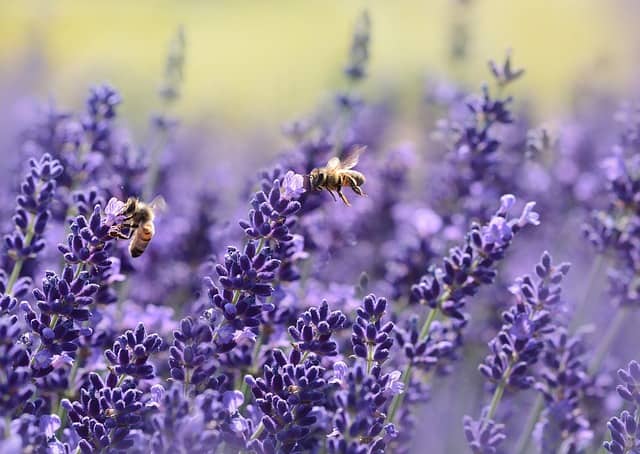Lavenders are beautiful purple flowers, best known for their mind-blowing fragrance. Thanks to this fragrance alone, several animals enjoy feasting on the plant. But what about deer? Do they love lavender? Or would they consider it an easy pass? In this article, we will talk all about that.
Over the following few sections, you will find all the required information that will keep your beautiful flowers safe from the prying eyes of deer and other animals. Additionally, we will also shed light on the kind of plants deer enjoy eating and the ones they don’t.
So, if you want to keep your garden safe, here’s everything you need to know.
Do Deer Like Lavender?
No. Luckily deer don’t prefer lavenders. That is why lavenders are popularly known as a deer-resistant plant. Mostly, deer aren’t quite attracted by the intense fragrance of lavender. They feel the same way about Foxgloves, which are yet another plant with lavender-Esque fragrance.
It is worth noting, however, that if the deer is famished and they can’t find any appetizing plant at sight, they might take a couple of bites from your lavender plant. However, that too is rare. Mostly, deer won’t heavily damage your beautiful flowers.
Why Do deer Not Like to Eat the Lavender?
Deer do not usually prefer lavender because of its strong scent. Since these flowers also have a pungent odor, most deer are naturally deterred by it. But why exactly do deer avoid this scent in the first place?
Well, this is all in nature. Since certain plants with similar scents are harmful to deer, they have the inherent instinct to avoid the source of the scent. Since the source of the scent here is your lavender plants, you can rest assured about deer not gorging on them.
Interestingly, despite their apparent fear, in reality, lavender isn’t poisonous to deer. In fact, the plant is relatively safe, unless consumed in a significantly large increment.
Just like deer, most other pets don’t enjoy consuming lavender bushes either. In case you are still worried about them accidentally consuming your beloved plant, consider placing them in a spot, your pet won’t visit as frequently.
The intrinsic fragrance of lavender is known to benefit gardeners far and wide because, in addition to deer, they also prevent rabbits, mice, squirrels, raccoons, and other tiny animals from invading your garden. Since most of these animals avoid the plant, you can always enjoy your floral bush knowing that it is free from any potential attack.
Note: As with any other plant, lavenders will attract bugs and small insects for pollination. This is absolutely safe and natural.
Do Deer Eat Lavender Bushes?
The short and simple answer to this is No. Most deer won’t touch your lavender bush as they are completely repelled by the scent it exudes. When you plant lavenders, you are actually a step closer to protecting your property from deer.
Lavender bushes won’t satisfy a deer, and they will therefore avoid it completely. With that said, you need to plant several lavender bushes for the trick to happen. Make sure you have a dense line of shrubs. These shrubs will collectively ward off the deer and ensure that they don’t return any time soon.
In rare scenarios, if the deer is extremely hungry and has no other option, they might consider your lavender bush as the last resort. However, these scenarios are extremely rare and unlikely.
Which Plants Deer Do Not Like to Eat?
When it comes to deer and their relationship with plants and shrubs, you have your share of both good and bad news. The downside here is that no plant can be completely deer-repellant. The positive news? Well, there are other plants that deer might only consider feasting on because they are left with no other option.
In this section, we will talk about a few such plants that aren’t as loved by deer.
1. Summer and Spring Plants
If you’re looking for summer plants to resist deer, daffodils and imperials might be good options. In case you are planning imperials, make sure they aren’t positioned in proximity to your home. That is because these flower bulbs come with an intense odor that most may not prefer.
During spring months, you can try adding a bunch of lilies of the valleys, foxgloves, and others. Available in a range of colors, they brighten up your garden and ward off deer simultaneously.
If you are looking to maintain the color of your garden and also ward off deer at the same time, try getting calendula plants, marigolds, and even zinnias. Each of these needs full sun and they’ll work amazingly well in deterring deer.
2. Bee Balms
As evident from the name, these perennials are known for their colorful blooms that attract bees, flies, birds, and every other pollinator. They form flowers in clumps and these flowers, regardless of the species, tend to return annually.
Bee balms are not quite popular among deer for their intense fragrance. So, if you are looking for a sure and effective way to treat this issue, getting these plants may be a good idea.
3. Foamflowers
Thriving best in US hardiness zones four to nine, these are yet another attractive plant that is often frequented by pollinators. Since they tend to be low growing and their foliage is extremely hairy, deer won’t end gorge to these plants in the first instance.
Stooping down takes plenty of effort, and most deer wouldn’t put in the required effort. Also, most deer prefer taller and succulent variants over the low-growing ones. So, if you really want to deer-proof your home, try growing an entire carpet of these beautiful plants.
Deer Resistant Plants for Shady Gardens
If you have a shady garden, you’re probably under the constant fear of being visited by the deer. However, you needn’t despair as much, as there are full-proof solutions for your garden as well.
You can choose from colorful shrubs of Japanese fern to stunningly elegant Ostriches. Since these ferns aren’t as affected by dryness, you wouldn’t require daily watering either.
You can also opt for astilbe if you are not willing to compromise on color to protect your plants from deer attacks. In addition to warding off deer, these perennials feature beautiful blooms in white and pink. Some species also have a red and purple bloom.
Regardless of the color, all of these blooms are perfectly light and airy with beautiful plumes ranging from one to four feet in height. Since astilbes require plenty of moisture, make sure they get what they need for optimal growth and consistently beautiful blooms.
Which Plants Do Deer Like to Eat the Most?
As with the deer repellant plants, there are other kinds of plants that attract deer. We’ve listed some of them here. So, if you already have them in your garden or are planning to plant them any time soon, make sure you follow all the required precautions so that deer are warded off at the right time.
1. Daylilies
Who doesn’t enjoy watching a stunning display of bright daylilies? Unfortunately, lilies are also a favorite of deer and they will take the first opportunity to weed out the plant and eat its flowers.
Typically, deer enjoy the daylily bulbs, though they also consume the foliage and the flowers. So, if you are planting daylilies, make sure you also follow the required preventative measures like installing a fence, using deer repellants, and planting shrubs and plants that deter deer.
2. Blueberries
Blueberries boost health and are rich in antioxidants. They also look pretty and improve the appearance of the dullest gardens. However, just like humans, deer love eating blueberries too.
If they manage to spot your plant, they will eat up the entire thing including the leaves. So, if you do not want your berries to face a similar predicament, make sure you follow the right strategies to ward off deer for good.
3. Yews
These plants, especially the Japanese variants are popular shrubs that are primarily planted in cold and wintry areas. The plants feature beautiful leaves and bright red fruits that may be toxic to humans. Most deer, however, do not have a similar opinion. Toxic or not, they will consume the entire plant including the leaves.
4. Tulips
It goes without mention that tulips are the top favorite among deer. So, if you are planning to plant a carpet of tulips in your garden, make sure you consider this one factor before making the big move.
Well, that’s all you needed to know about keeping deer off your property and especially off your beautiful lavender shrubs. Since deer are naturally repelled by lavender’s fragrance, you can have peace of mind knowing that they will never prowl on your property to damage the flowers.
Since we have also discussed the plant’s deer love and hate eating, you can set proper fences to deter all potential attacks. Typically, if you are looking to protect your location from hungry deer and other wildlife, consider using granular or other kinds of animal repellants. You can also create extra protection for your landscape by creatively placing fences and borders.






